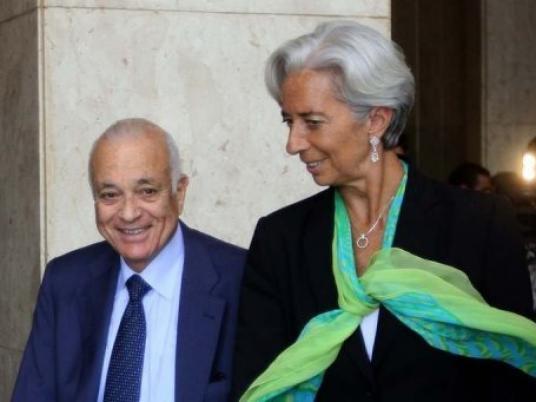 An October report from IMF’s Tokyo meeting, which Egyptian officials attended, recommends that the government allow the country’s currency to respond to market forces as a short-term policy solution to closing the widening budget deficit.
An October report from IMF’s Tokyo meeting, which Egyptian officials attended, recommends that the government allow the country’s currency to respond to market forces as a short-term policy solution to closing the widening budget deficit.
“Allowing the currency to move in line with market forces — while avoiding excessive short-term volatility — would help protect international reserves and competitiveness, while mobilizing foreign financing on favorable terms could bridge temporary balance of payments gaps,” the report, titled “Arab Countries in Transition: Economic Outlook and Key Challenges,” said.
The Egyptian government is in ongoing discussions with the IMF to secure the US$4.8 billion loan, news outlets reported on Sunday.
The government and the IMF are in agreement that the most pressing economic issue is the growing government deficit, and that it needs to be reduced by at least 20 percent, state-run news service MENA reported.
The only differences in opinion between the delegation and the government is how exactly the deficit should be decreased, with the Egyptian government favoring a progressive income tax and reducing subsidies, a source close to the negotiations told MENA.
The officials said the IMF delegation had approved of the government’s presented plan to streamline subsidies and raise tax revenue at the beginning of the visit last week.
The source also told MENA that the delegation had not alluded to any forced devaluation of the pound in its talks so far.
Meanwhile, the Egyptian pound fell to its lowest value in eight years on the first day in the delegation’s visit. The currency was bid as low as 6.1112 to the US dollar on Wednesday.
Traders told Reuters on Wednesday, that in allowing the pound to depreciate, the government was demonstrating to the IMF that it will be flexible with its currency in the coming period. Many experts say the Egyptian pound has become significantly over-valued against the dollar.
IMF and Egyptian government officials have repeatedly said that currency devaluation is not a condition for receiving the loan.
In the 12 October report, the IMF also recommended that Egypt implement “a comprehensive and broadly supported economic program that addresses effectively the country’s imbalances,” cut back un-targeted energy subsidies, increase spending on infrastructure, education, and health, streamline burdensome regulations, and improve access to financing, especially for small enterprises.
Experts say that despite the progressing talks, much about the government’s economic reform plan remains unclear, saying officials have offered sparse explanation for how they will tackle the country’s economic predicament.
The government has yet to show, for example, how it will go about cutting subsidies.
“There are existing contracts between industry and the government, and officials have said there would be no retroactive implementation of this decision,” said Angus Blair, founder of The Signet Institute, a Cairo-based think-tank on MENA economies. “It’s unclear how they’re going to deal with this.”
Blair said officials and experts who say the loan will signal a turning point in the country’s economic recovery are off-base.
“It depends on the structure of the package of measures being proposed," he said.
He’s not so optimistic that an agreement with Egypt and the IMF will reflect positively on the market.
“Reality will hit, and serious action needs to be taken to induce domestic confidence,” he said.
The market mirrored Blair’s concerns on Sunday, with the EGX 30 index dropping 2.24 percent.
He also sees the government’s quietly allowing the pound to fall as not entirely reassuring.
“I would rather they had done it as part of a package to restore confidence,” he said.



